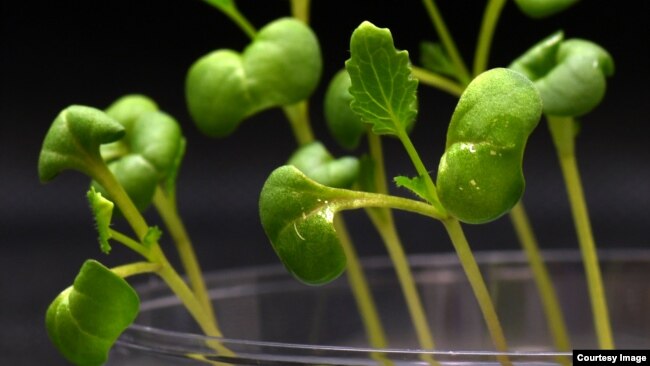まさに、暗闇に光明です!!
コロナ、気候変動、ウクライナ戦争・・・傷ついた世界を救う一筋の光!!
VOAで英語を学びましょう!!
- 新しい人工光合成プロセスにより、暗闇でも植物を育てることが可能に(和訳)
- New Artificial Photosynthesis Process Can Grow Plants in the Dark
新しい人工光合成プロセスにより、暗闇でも植物を育てることが可能に(和訳)
New Artificial Photosynthesis Process Can Grow Plants in the Dark
July 14,2022
科学者たちは、暗闇の中でも植物を育てることができる人工photosynthesis光合成プロセスを開発しました。このプロセスは、世界的に需要が高まっている食料生産の新しい方法を提供するために考案されたものです。
※photosynthesis:光合成【fòutousínθisis】(発音が難しい!)
光合成は、植物が太陽からエネルギーを取り込み、生命維持に必要な炭素と酸素を生産するものです。このプロセスは、多くの植物の生長を支える重要なものです。
しかし、科学者たちは、太陽からのエネルギーのうち、実際に食料を生産する植物が取り込んでいるのは約1%に過ぎないと推定しています。
このたびの研究で、研究者らが開発した人工光合成法は、いくつかの食品を育てる際に最大18倍の効率を発揮したことが報告されました。また、この方法は完全な暗闇でも実施可能です。
この研究結果は、Nature Food誌に掲載されました。研究チームは、カリフォルニア大学リバーサイド校とデラウェア大学のメンバーで構成されています。
研究者たちは、 “electrolyzer system””電解槽システム”を使って、二酸化炭素、電気、水をacetate酢酸に変えることに成功しました。酢酸は、酢を含む多くの家庭用品に含まれる主な化合物です。
デラウェア大学の研究者たちは声明の中で、電解槽のプロセスによって、二酸化炭素に含まれる炭素分子の57パーセントを効果的に酢酸に変えたと述べています。そして、得られた酢酸混合物を、暗闇の中で植物を育てるための食料として使用しました。
研究者たちは、9種類の食用植物を使って実験を行いました。レタス、米、エンドウ豆、トマト、ピーマン、タバコなどです。研究チームは、これらの植物がすべて酢酸から炭素を取り込むことができたと報告しています。
また、藻類、酵母、キノコを作る菌類でも実験が行われました。その結果、藻類では、太陽光で光合成的に栽培するよりも4倍効率が高いことがわかりました。また、酵母の生産は、トウモロコシから砂糖を採取する通常のプロセスよりも18倍効率的でした。
レタスの人工光合成の結果は、試験したすべての食用作物の中で最も良好でした。
この研究の共同執筆者であるエリザベス・ハンさんは、「私たちは、生物学的な光合成の寄与なしに、食物を生産する生物を育てることができたのです。」と述べています。彼女はカリフォルニア大学リバーサイド校のJinkerson研究室の博士課程に在籍しています。
ハンさんは、このプロセスは、何百万年も前から行われている生物学的光合成の方法よりも、エネルギーを食料に変える効率がはるかに高いと付け加えています。
研究者らは、このプロセスによってエネルギー効率も高まったと報告しています。electrolyzer電解槽に電力を供給する太陽電池と併用した場合、太陽光と自然の光合成によって作られる同量の食物を育てるために必要なエネルギーは、この方法のわずか4分の1でした。
科学者たちは、この方法が、従来の作物栽培をより困難にしている気候変動の影響に対抗するのに役立つと述べています。
研究者らは、「人間や動物が食べる作物が、より少ない資源で、制御された環境で育てば、干ばつや洪水、土地の減少が世界の食糧安全保障に与える脅威は少なくなるでしょう。」と指摘します。
ロバート・ジンカーソン氏はカリフォルニア大学リバーサイド校の化学・環境工学の教授です。彼は、人工光合成によって食物を栽培すれば、農地を拡大することなく、世界の食糧需要の増加に対応できると述べています。
「太陽エネルギーを動力源とすることで、一定の面積の土地でより多くの食料や飼料を生産できるようになるかもしれません。」と、ジンカーソン氏は述べています。
研究者たちは、より効果的な酢酸混合物を生産するために、電解槽システムの改良を続ける予定だと言います。また、酢酸で完全に育つような生物工学植物の可能性も探りたいとしています。
※bioengineer;生物工学/バイオテクノロジーとも呼ばれ、生物の優れた機能を生かして産業や医療への応用をめざす学問。 大学では「遺伝子工学」「細胞工学」といった技術を中心に研究が進められる。 遺伝子工学では遺伝子の構造分析や遺伝子組換え技術などを、細胞工学では細胞を用いて有用な細胞や物質の生産技術を学ぶ。-河合塾Kei-Netより
New Artificial Photosynthesis Process Can Grow Plants in the Dark
Scientists have developed an artificial photosynthesis process that can grow plants in the dark. The process is designed to provide a new way to produce food as worldwide demand grows.
Photosynthesis involves plants taking in energy from the sun to produce life-supporting carbon and oxygen. The process is important to support the growth of many plants.
But scientists have estimated that only about 1 percent of energy from the sun is actually captured by plants that produce food.
Researchers report in a new study that the artificial photosynthesis method they developed performed up to 18 times more efficiently in growing some foods. And the process can be carried out in complete darkness.
Results of the study recently appeared in the publication Nature Food. The research team included members from the University of California Riverside and the University of Delaware.
Researchers used an “electrolyzer system” to turn carbon dioxide, electricity and water into acetate. Acetate is the main compound found in many household products, including vinegar.
The electrolyzer process effectively turned 57 percent of carbon molecules in carbon dioxide into acetate, University of Delaware researchers said in a statement. The resulting acetate mixture was then used as food to grow plants in the dark.
The researchers experimented with nine different food plants. These included lettuce, rice, peas, tomatoes, pepper and tobacco. The team reported that all these plants were able to take in carbon from the acetate.
Experiments were also carried out with algae, yeast and a fungus that produces mushrooms. The study found that, for algae, the process was four times more efficient than growing the material photosynthetically with sunlight. And yeast production was 18 times more efficient than the usual process involving sugar collected from corn.
Lettuce produced the best results from artificial photosynthesis out of all the food crops tested.
“We were able to grow food-producing organisms without any contributions from biological photosynthesis,” said the co-writer of the study, Elizabeth Hann. She is a doctoral candidate at UC Riverside’s Jinkerson Lab.
Hann added that the process is much more efficient at turning energy into food than the biological photosynthesis methods, which have taken place for millions of years.
The researchers also reported that the process increased energy efficiency, too. When used together with a solar cell to power the electrolyzer, the method required just one-fourth the energy to grow the same amount of food created by sunlight and natural photosynthesis.
The scientists said their method could help fight the effects of climate change that are making traditional crop-growing more difficult.
“Drought, floods and reduced land availability would be less of a threat to global food security if crops for humans and animals grew in less resource-intensive, controlled environments,” the researchers noted.
Robert Jinkerson is a professor of chemical and environmental engineering at UC Riverside. He said growing foods through artificial photosynthesis could help the world meet its rising demand for food without the expansion of agricultural lands.
“Using solar energy to power our process could allow for more food or animal feed to be produced on a given area of land,” Jinkerson said.
The researchers said they plan to continue improving the electrolyzer system to produce a more effective acetate mixture. They also want to explore ways to possibly bioengineer plants that grow completely on acetate.
Words in This Story
artificial – adj. not natural, but made by people
efficient – adj. working well and not wasting time or energy
vinegar – n. a sour, acidic liquid that is often used in food preparation
fungus – n. a kind of plant without leaves that gets its food from other living or delaying things
contribution – n. something used to help produce or develop something or help make it successful
solar – adj. relating to or involving the sun
drought – n. a long period of time during which there is very little or no rain
allow – v. to permit
